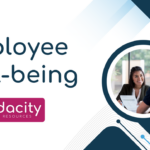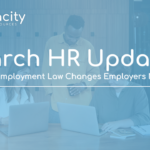HR Hot Topics
In this article, we share a compilation of HR hot topics, including voting laws, independent contractor classification, flex spending limit increase, hero pay, minimum wage, and pay transparency trends.
Hot Topics: Election Laws
Elections are just around the corner, so it is important for employers to know and understand voting laws and encourage all employees to vote.
Minnesota Voting Laws
Minnesota law requires employers to permit employees to take off, with pay, the time needed to vote in an election. The statute provides:
“Every employee who is eligible to vote in an election has the right to be absent from work for the time necessary to appear at the employee’s polling place, cast a ballot, and return to work on the day of that election, without penalty or deduction from salary or wages because of the absence. An employer or other person may not directly or indirectly refuse, abridge, or interfere with this right or any other election right of an employee.”
Wisconsin Voting Laws
Wisconsin law requires an employer to provide an employee up to three (3) hours of time off to vote if the employee request the leave prior to the day of the vote or election. The voting leave does not need to be paid and an employer may determine when an employee takes voting leave.
Hot Topics: Independent Contractor Proposed Rule
The Department of Labor (DOL) issued a proposed rule to clarify independent contractor status under the federal Fair Labor Standards Act (FLSA).
The proposed rule would rescind guidance from 2021 that established two core factors that carried greater weight when making independent contractor decisions: control over the work and opportunity for profit and loss. According to the U.S. Secretary of Labor Marty Walsh, this has resulted in an increase in misclassification, depriving “workers of their federal labor protections, including their right to be paid their full, legally earned wages.”
The DOL reports the proposed rule would do the following:
- Align the department’s approach with courts’ FLSA interpretation and the economic reality test.
- Restore the multifactor, totality-of-the-circumstances analysis to determine whether a worker is an employee or an independent contractor under the FLSA.
- Ensure that all factors are analyzed without assigning a predetermined weight to a particular factor or set of factors.
Employers are encouraged to submit their input during the public comment period.
Hot Topics: Health Care Flexible Spending Cap Increase
The health care flex spending cap will increase to $3,050 for 2023. That means employees have the option to flex an additional $200. If the plan allows carryover of unused health flex spending amounts, that carryover will increase to $610.
Hot Topics: Minnesota “Hero Pay”
According to the Minnesota Department of Labor and Industry, more than one million applicants were approved for Frontline Woker Payments. Starting in October, workers that met eligibility requirements will receive payment of $487.45.
Employees eligible for “hero pay” included workers in health care, nursing homes, courts, prisons, schools, day care facilities, food manufacturing operations, restaurants, grocery stores, retail stores, hotels, public transit, and janitorial and facility maintenance services.
Hot Topics: Minnesota Minimum Wage
The Minnesota minimum wage will increase on January 1, 2023:
| January 1, 2022 | January 1, 2023 |
Small Employer | $10.33 | $10.59 |
Large Employer | $8.42 | $8.63 |
A friendly reminder to Minnesota employers, don’t forget to also update your minimum wage poster in 2023! An updated poster is now available and free to download online.
Hot Topics: Form I-9
The U.S. Department of Homeland Security (DHS) announced that employers should continue to use the current Form I-9 after its Oct. 31 expiration date, until further notice.
Hot Topics: Updated EEOC Poster
The Equal Employment Opportunity Commission (EEOC) replaced the “EEO is the Law” with an updated “Know Your Rights” poster that provides information about unlawful workplace harassment and discrimination under federal law. As a result, covered employers should update their EEOC poster.
Hot Topics: Pay Transparency Laws
Pay transparency laws are picking up momentum across the U.S. For example, states laws in Colorado, California and Washington require employers to list pay ranges in job postings.
Pay transparency expectations have also increased from job candidates. According to a recent survey from job search engine Adzuna:
- 28% of respondents said that no salary details or a lack of salary clarity (including very large salary ranges) on job ads is their biggest frustration.
- 33% said they would not attend a job interview before knowing the salary being offered.
Although about one-third of respondents (32%) assumed the organization is hiding something if they don’t include pay information in job posts, only 3% of employers in the U.S. are transparent about compensation. However, because of the tight labor market and staffing struggles many organizations face, some are retooling their process to provide greater transparency.
Stay Tuned!
As we wrap up 2022 and prepare for 2023, stay tuned for future HR developments and laws that impact employers across the nation.
About the Author
Human Resources thought leader, Stacy Johnston, provides innovative solutions with a mission to support organizations in understanding and engaging their biggest competitive advantage… their employees. Johnston is a licensed attorney and holds the SHRM-CP and PHR credentials.
Interested in HR support? Check out the online resources at www.audacityhr.com.
Looking for resources to prevent workplace bullying? Check out our blog posts: Part 1 and Part 2!






